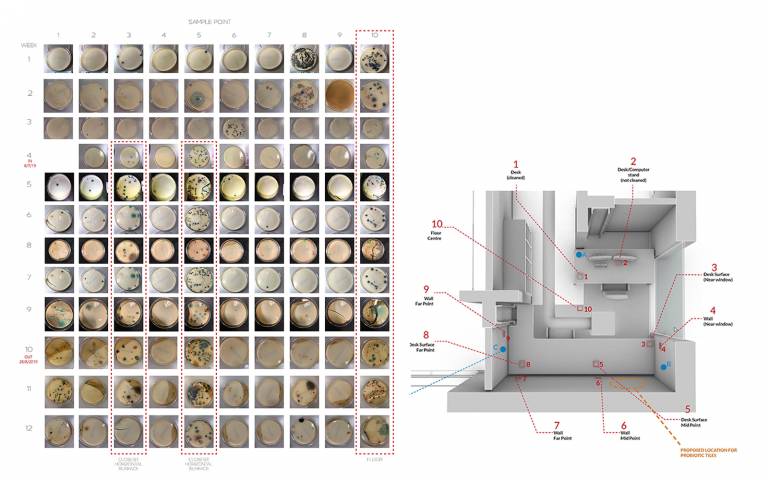The Bartlett's Richard Beckett Honoured at the RIBA President’s Awards for Research 2020
19 January 2021
Richard Beckett won the Design and Technical prize at the RIBA President’s Awards for Research 2020.

We are pleased to announce that Richard Beckett from The Bartlett School of Architecture has won the prestigious RIBA President's Award for Research. As well as being declared the 2020 winner of the competition, his project 'Probiotic design' won in the Design and Technical category (pictured below). It was a successful year for The Bartlett, with three other projects from Bartlett staff and alumni nominated for in this year's shortlist. The awards moved online this year due to COVID concerns.
The awards celebrate excellence in research across architecture and the built environment, and spotlight the need for research across the profession to nurture innovation and strategic thinking.
President's Medal for Research, and Award for Design and Technical winner:
Richard Beckett, Probiotic design

Richard's research offers a fascinating and in-depth technical investigation of how and why we might 'reintroduce good bacteria' (probiotics) back into our built environment; a lack of which has been linked to increasing numbers of chronic and autoimmune illnesses in modern cities.
'Probiotic design' explores the microbial world with different environments, materials and scales to develop and test prototype building elements designed to support the growth of beneficial bacteria.
The research proposes a novel probiotic design approach towards designing healthy buildings in relation to beneficial microbes. It fundamentally challenges modern approaches to healthy buildings that assume fewer microbes as the default healthy condition. Evidence suggests that separation of the human from the non-human has gone too far and that missing microbes are playing a role in the emergence of chronic and autoimmune illnesses observed in developed cities. The research uses an interdisciplinary approach between microbiology and architecture to develop living materials embedded with beneficial bacteria for buildings to directly shape the indoor microbiome towards a healthier microbial condition. It explores this through a range of scales from the micro scale of the material and microbe up the macro scale of indoor environment and the body. This approach utilises a mix of in vitro and in silico methodologies to explore the design, fabrication and survival of living probiotic materials which are then scaled up to the building scale as a series of probiotic tile surfaces and installed in a test space to monitor their effect on the indoor microbiome.
“There is a risk that the current pandemic exacerbates our preference to further separate ourselves from the non-human microbial world which could result in unintended, longer term public health problems. Future cities should value human and non-human agency and architects will need to work with experts from non-traditional fields including microbiologists, virologists and environmental engineers towards creating healthy and resilient built environments."
- Richard Beckett
More information
- See the full list of winners at RIBA’s website
- Read about Richard Beckett's research at the RIBA website
- Visit Richard Beckett's profile
Images: Richard Beckett
 Close
Close

